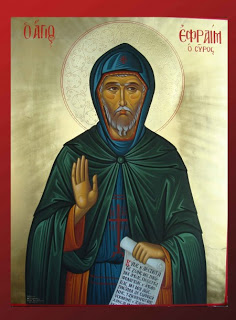By Bishop Grigorios of Mesaoria
Today our Church commemorates the Venerables Palladius the Hermit of Antioch, James the Ascetic of Porphyreon, and Ephrem the Syrian.
Saint Ephrem is one of the holiest and most prolific teachers of Orthodoxy, so it is no coincidence that he was praised by Saint Basil the Great and many other Venerable Fathers in their words and references. He was born in Nisibis, Syria, in 306 AD by Christian parents. With the help of Bishop Jacob, he received excellent theological and scientific education. He, as a child, loved especially to study the Bible and as a writer he was passionately engaged in its interpretation, as well as in the acquisition of virtues, since he remained committed to solitary life.
In difficult times for the Church, due to his various sects, Ephrem was distinguished as a steadfast teacher of Orthodoxy, and in his ascetic speeches and other writings, which to this day are affectionate and wholesome readings, benefited innumerable souls in the regions where he teached.
Saint Ephrem was a model of asceticism and temperance, and his humiliation and landlessness were proverbial, since, in anticipation of his death in 379 AD, he commanded all his belongings to be given to the poor, including his clothes destined to clothe his dead body.
Saint Palladius the Hermit, who is also honoured today, built a small cell on the mountain, and there, with much vigilance, fasting, and unceasing prayer, was claimed by the Triune God to perform miracles for the comfort of men.
Once a merchant, who had been robbed and fatally wounded by a savage robber, was found at his door. Then everyone, not wittingly but out of “zealousness” and frivolity, blamed Palladius for the merchant’s murder. But Palladius prayed and the merchant rose up, naming the true murderer, who was among those who accused Palladius. This miracle made him gain the reputation of a holy man in the area.
Saint Palladius lived with godly devotion, became a great hermit of the desert, and completed his earthly life peacefully and venerably.
Source: Church of Cyprus















